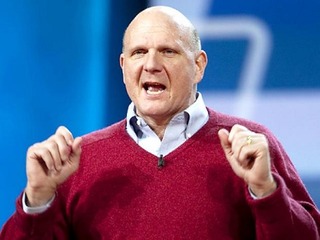Midi Health, a virtual care clinic for women's health, raises $60M
Midi is currently on track to serve about 100,000 patients this year, up from about 30,000 in 2023
Read more...
When Zynga CEO Don Mattrick announced earlier this month that he was going to be restructuring the company, which included eliminating divisions and positions, the first thing that came to my mind was how the plan sounded awfully similar to the big reorganization that Microsoft had undergone just a couple of months ago.
To wit, Microsoft split itself into 12 different functions, including four engineering areas, each with its own leader. Meanwhile, Zynga has decided to itself it into three separate divisions, with 13 managers reporting directly to Mattrick.
In both cases the restructuring was done in order to refocus on the company, and to get everyone within the company onto the same page. For Microsoft, that meant transitioning from a software company to a hardware company. For Zynga, that simply meant becoming leaner and less bloated as it tried to stay afloat.
But even if Mattrick was inspired to organized his company by the way his old boss did it, there is actually someone else that that I believe should be looking to for inspiration instead. Someone who has done a remarkable job of successfully reorganizing over the past year: Yahoo CEO Marissa Mayer.
Zynga and Yahoo
Yahoo is the best example for Zynga to look to for a few reasons.
First, because, when you compare the two companies, the position that Zynga finds itself in now is strikingly similar to the where Yahoo found itself at this time roughly a year ago.
For example, in both situations the company is coming off the loss of its CEO; for Yahoo, it was Scott Thompson who was gone after only four months due to resume fudging scandal. For Zynga, it was founder Mark Pincus, who founded the company and then left a mixed legacy, at best.
Perhaps coincidentally, both companies had also recently laid off a large percentage of its employees the month before the CEO left. In April of last year, Yahoo laid off 2,000 people, or 14% of its workforce. By May, Thompson was gone. In June, Zynga fired 520 people, or 18% of its employees. By the beginning of the next month, Pincus had stepped down.
But the comparisons between the two go deeper than that. What really lumps Zynga and Yahoo together are the systemic problems that both companies have had to deal with, and fix, including their reputations in the industry.
Both companies became known as a place where start-ups went to die.
Want to know how bad things had become at Yahoo? Look at what happened when Yahoo bought Tumblr earlier this year. Before the deal was even done, Wordpress reported seeing big spikes from users fleeing, worried that their beloved site was about to turn into another Flickr. A reputation like that can be hard to shake once it has becomes engrained.
As for Zynga, it was the disasterous purchase of OMGPOP that gave the company a similar reputation. Zynga overpaid, spending $180 million on the studio, and then did not seem to know what to do once Draw Something, OMGPOP's only successful game, inevitably burned out. A year and a half after it was purchased, OMGPOP was shut down.
Obviously, that is hardly the type of signal the company wants to send to other studios, which would make them rightfully concerned about suffering the same fate.
And then there is the failure of both Zynga and Yahoo to transition to mobile. They both missed the boat and it caused major problems, as they have tried to catch up ever since.
Mayer admitted to the company's failings in a conference call last October, in which she said that, though Yahoo had “made progress” on the mobile front, the company was behind because it had no effectively optimized the site for mobile, had under invested in mobile development, and had splintered the brand into 76 applications across Android and iOS.
Pincus did much the same thing around the same time, admitted that gaming integration onto smartphones and tablets was faster than the company had anticipated, and that this was part of the reason that Zynga had fallen short of its own expectations.
What Zynga can learn from Yahoo
With all of these similarities, where Yahoo and Zynga differ is in how they responded to them. In that Yahoo has been making any progress toward fixing these problems, while Zynga still seems stuck in the mud.
Yahoo, under Mayer's leadership, has seen a pretty remarkable recovery, and it has done this by making a full tilt toward mobile, acquiring a lot of good young talent and revitalizing its image in the process. And a big part of what has made people stand up and take notice is Yahoo's willingness to take its old, outdated products and give them a more modern look and feel.
That has included updating Flickr with a redesigned homepage and activity feed, a new Android app, and one terabyte of storage space for each user.
Yahoo also updated the Homepage to make it more social and personalized, allowing users to log in via Facebook and see birthday reminders and articles that their friends have read. The homepage was given a mobile update, with optimization for smartphones and tablets.
Also getting updates were Yahoo News to make it more personalized, with the site learning users preferences and personalizing their newsfeed, and Yahoo Mail, with the integration of Dropbox to allow Yahoo users to access their Dropbox right from their inbox.
All of this gives the appearance that Yahoo cares about their products, and, by extension, the customers who use them.
Zynga has not taken the same approach, at least not yet. And that has been to its detriment.
The company has stated repeatedly that it is putting its focus on growing franchise games, but the company has not been doing anything that has made them stand out from the pack. That, compounded with the ill-received decision to drop efforts to bring real money gaming to the United States, despite spending so much time spearheading that initiative, has made Zynga look like a company that is following, rather than leading.
Releasing sequels is all well and good, especially when they are successful, but when Zynga had a chance to be on the forefront on a new type of gaming in the United States, the company took a pass. That gives the impression of a company too afraid to take any risks that may rock the boat, not one that is innovative and forward thinking.
Mayer has also been able to give her company a fresh new outlook with an infusion of new talent through a series of startup purchases, most of which have been acqui-hires. That has included news summarizer Summly, address book management app Xobni, rich media service Qwiki and, most recently, commerce app platform Lexity.
A few of these companies have been left independent, or integrated into Yahoo, but most of them were shut down in favor of bringing the talent over to Yahoo's products. Once again, Yahoo is giving off the vibe of being a fresh and vital company; a place where people with innovative ideas want to go.
It should also be noted that almost, if not all, of these purchases were of companies making headwinds on mobile. It’s an easy, and simple, solution for a company with the resources Yahoo has: the company brought in a bunch of people with experience developing for the platform.
This is a strategy that could also benefit Zynga; the company keeps talking a good game about mobile, but the games simply have not been new and fresh enough to be successful. Right now, the developer only has one mobile game in the top 10 of monthly active users: Farmville 2, according to social games analytics site AppData.
Pulling a Yahoo, and bringing in developers with a specialty in mobile, who know how to get the most out of the platform, would be the quickest way for Zynga to be as dominant on smaller screens as it once was on PCs.
But Zynga, again, is being too methodical in its approach. Instead of finding talent to bring it to revitalize its offerings, the company has only made one purchase this year, that of real money gaming studio Spooky Cool Labs in June. Zynga has, of course, since abandoned the idea of going after that market, at least in the United States, so its hard to see what the point of that purchase even was.
So what happens next?
Yahoo's method of digging itself out of the hole is obviously not the only way to go about it. But this strategy has worked for them, and I believe it could work for Zynga.
Mayer has a lot to show for her effort, including a stock that rose nearly 75% in her first year as CEO. And the company recently topped Comscore's list of most visited U.S. Web properties in July, beating out Google for the first time in years.
Can you imagine if Mattrick was able to affect the same kind of turnaround after a year of heading up Zynga? Chances are that is not going to happen, even by Mattrick's own admission, but Zynga needs to do something if it wants to see a similar outcome.
(Image source: https://www.digitaltrends.com)
Midi is currently on track to serve about 100,000 patients this year, up from about 30,000 in 2023
Read more...Wheel clinicians will be able to prescribe Owlet's BabySat, which monitors oxygen and heart rate
Read more...Amish Jani, Founder and Partner at FirstMark, joined the company's Board of Directors
Read more...Startup/Business
Joined Vator on
Zynga is the largest social gaming company with 8.5 million daily users and 45 million monthly users. Zynga’s games are available on Facebook, MySpace, Bebo, Hi5, Friendster, Yahoo! and the iPhone, and include Texas Hold’Em Poker, Mafia Wars, YoVille, Vampires, Street Racing, Scramble and Word Twist. The company is funded by Kleiner Perkins Caufield & Byers, IVP, Union Square Ventures, Foundry Group, Avalon Ventures, Pilot Group, Reid Hoffman and Peter Thiel. Zynga is headquartered at the Chip Factory in San Francisco. For more information, please visit www.zynga.com.

Joined Vator on

Joined Vator on





